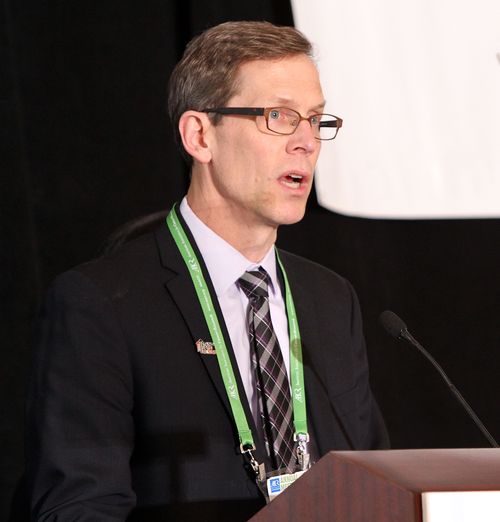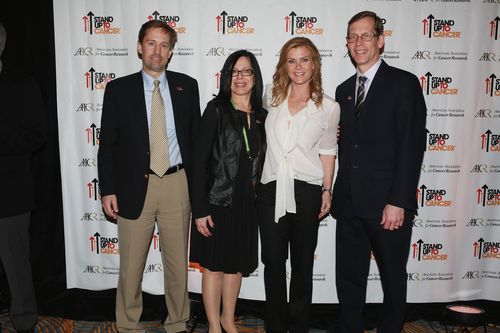Cancer Researchers and Celebrities Come Together for a Stand Up to Cancer Event to Announce New “Dream Team”
“It can run, but it can’t hide.”
That’s the message Robert Vonderheide, MD, DPhil, the Hanna Wise Professor in Cancer Research in the Abramson Cancer Center (ACC) and the Perelman School of Medicine, had for the crowd when he took the podium at the Stand Up to Cancer (SU2C) event in San Diego announcing the new pancreatic cancer “Dream Team” he’ll co lead alongside Elizabeth M. Jaffee, MD, professor of oncology at Johns Hopkins University. “It’s time to beat this thing,” he said.
 Thanks to an $8 million grant from SU2C and the Lustgarten Foundation, the “Dream Team” may do just that. The group, which includes researchers from the ACC and institutions across the United States and England, will work together to develop new therapies to harness patients’ own immune cells to treat pancreatic cancer—one of the most promising avenues for cancer.
Thanks to an $8 million grant from SU2C and the Lustgarten Foundation, the “Dream Team” may do just that. The group, which includes researchers from the ACC and institutions across the United States and England, will work together to develop new therapies to harness patients’ own immune cells to treat pancreatic cancer—one of the most promising avenues for cancer.
But despite advances in treating leukemia and melanoma with immunotherapy, such clinical efforts for pancreatic cancer lag behind. “This is the type of funding that can make a huge difference,” Vonderheide said. “We believe the immune system ultimately has the power to cure pancreatic cancer. We’ve learned a lot about the power of the immune system in other tumor types… now it’s time for pancreatic cancer.”
The new effort, titled “Transforming Pancreatic Cancer to a Treatable Disease,” was announced this week during the American Association for Cancer Research annual meeting at a star-studded event filled with cancer researchers and patient advocates who shared their stories.
Alison Sweeney, soap star and host of the Biggest Loser, who lost her grandmother to cancer, hosted the event. She was joined by David A. Tuveson, MD, PhD, of the Lustgarten Foundation, as well as Patrick Swayze’s widow, Lisa Neimi.
 Swayze died of pancreatic cancer in 2009 at age 57, after a 20-month battle—a good fight when you look at the statistics. Today, 80 percent of patients who get the news that they have the disease will die within a year—making new approaches to fight the disease greatly needed.
Swayze died of pancreatic cancer in 2009 at age 57, after a 20-month battle—a good fight when you look at the statistics. Today, 80 percent of patients who get the news that they have the disease will die within a year—making new approaches to fight the disease greatly needed.
“It was only as early as last year that I went to check what the treatments were—this was four years after my husband died,” Neimi said. “They were the same.”
“But I feel like we are on the cusp of so many wonderful things,” she added. “These Dream Teams…are what we need. It’s time to move up to the front of the line. And there is going to come a day very soon that we are going to have the hope that some of these other cancers have.”
The Dream Team, which is also being supported in part by a gift to SU2C from the Fox Family Cancer Research Funding Trust, will begin enrolling patients into at least six clinical trials starting this year, some right here at Penn Medicine.
The goal is to “re-program” the tissue around patients’ tumors to fuel immune responses that will spur destruction of the tumor. That dense tissue is one of the biggest barriers to treating these patients because it suppresses the immune cells to fight the tumor.
Past studies from Vonderheide and his team have shown that activating immune cells with special antibodies can alter that tumor microenvironment. Best described as a Trojan horse approach, the tumor calls in immune cells known as macrophages, and re-educates them to attack – not promote – the tumor.
“We’re making great headway—and now it’s time to take it to the next level with new vaccine strategies combined with emerging approaches to block the molecules responsible for the suppression,” he said. "We could see a powerful breakthrough that could make a real difference on how we treat these patients."

Photo Credit: Getty Images